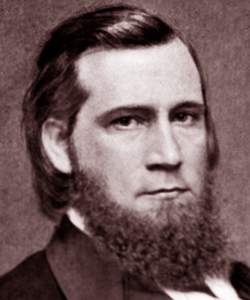Lucius Quintus Cincinnatus Lamar (American National Biography)
Scholarship
In Congress Lamar advocated "southern rights" and justified slavery. He stood with Senator Jefferson Davis of Mississippi in trying to avoid separate state secessions from the Union at the Charleston Democratic Convention of 1860, but when the movement gained momentum he wrote Mississippi's secession ordinance. Lamar provided a conservative rationalization that linked the Confederate revolution with the Declaration of Independence of 1776 and with the republicanism of the founding fathers.
After combat as a lieutenant colonel of the Nineteenth Mississippi in Virginia, Lamar fell ill with a debilitating paralysis and resigned from military duty in 1862. Named as Confederate states commissioner to Russia, Lamar traveled to Europe and temporarily undertook desultory duties in England and France in cooperation with other Confederate diplomats and agents. Political circumstances caused the Confederacy to abort the Russian mission, and Lamar was recalled without reaching his destination. During 1864 he did some work for the War Department in Richmond, but mainly he acted as Confederate president Davis's emissary in Georgia, where he conducted a public campaign in favor of the Habeas Corpus Act and other unpopular government actions. In December he rejoined the army and served as a judge advocate to a military court in Richmond.
After combat as a lieutenant colonel of the Nineteenth Mississippi in Virginia, Lamar fell ill with a debilitating paralysis and resigned from military duty in 1862. Named as Confederate states commissioner to Russia, Lamar traveled to Europe and temporarily undertook desultory duties in England and France in cooperation with other Confederate diplomats and agents. Political circumstances caused the Confederacy to abort the Russian mission, and Lamar was recalled without reaching his destination. During 1864 he did some work for the War Department in Richmond, but mainly he acted as Confederate president Davis's emissary in Georgia, where he conducted a public campaign in favor of the Habeas Corpus Act and other unpopular government actions. In December he rejoined the army and served as a judge advocate to a military court in Richmond.
James B. Murphy, "Lamar, Lucius Quintus Cincinnatus," American National Biography Online, February 2000, http://www.anb.org/articles/11/11-01030.html.
Lucius Quintus Cincinnatus Lamar (Congressional Biographical Directory)
Reference
LAMAR, Lucius Quintus Cincinnatus, (uncle of William Bailey Lamar and cousin of Absalom Harris Chappell), a Representative and a Senator from Mississippi; born near Eatonton, Putnam County, Ga., September 17, 1825; attended schools in Baldwin and Newton Counties; graduated from Emory College, Oxford, Ga., in 1845; studied law in Macon; admitted to the bar in 1847; moved to Oxford, Miss., in 1849, where he practiced law and served one year as professor of mathematics in the University of Mississippi at Oxford; moved to Covington, Ga., in 1852 and practiced law; member, Georgia State house of representatives 1853; returned to Mississippi in 1855; elected as a Democrat to the Thirty-fifth and Thirty-sixth Congresses and served from March 4, 1857, until his retirement in December 1860 to become a member of the secession convention of Mississippi; drafted the Mississippi ordinance of secession; during the Civil War served in the Confederate Army as lieutenant colonel until 1862; entered the diplomatic service of the Confederacy in 1862 and was sent on a special mission to Russia, France, and England; member of the State constitutional conventions in 1865, 1868, 1875, 1877, and 1881; professor of metaphysics, social science, and law at the University of Mississippi; elected to the Forty-third and Forty-fourth Congresses (March 4, 1873-March 3, 1877); did not seek renomination in 1876, having been elected Senator; chairman, Committee on Pacific Railroads (Forty-fourth Congress); elected as a Democrat to the United States Senate in 1876; reelected in 1883 and served from March 4, 1877, until March 6, 1885, when he resigned to accept a Cabinet post; chairman, Committee on Interior and Insular Affairs (Forty-sixth Congress), Committee on Railroads (Forty-sixth Congress); Secretary of the Interior in the Cabinet of President Grover Cleveland 1885-1888; appointed by President Cleveland to be Associate Justice of the United States Supreme Court and was confirmed January 16, 1888; served until his death in Vineville, Ga., January 23, 1893; interment in Riverside Cemetery, Macon, Ga.; reinterment in St. Peter’s Cemetery, Oxford, Miss., in 1894.
“Lamar, Lucius Quintus Cincinnatus,” Biographical Directory of the United States Congress, 1774 to Present, http://bioguide.congress.gov/scripts/biodisplay.pl?index=L000030.





